Main Prayers Used Daily in Iskcon; important! diksha memorization required!
Simple and easy anywhere Vaisnava prayers...
Mantra prayers to Sri Chaitanya Mahaprabhu and His associates should be spoken before chanting the Hare Krishna maha-mantra
sri-krishna-chaitanya
prabhu-nityananda
sri-advaita gadadhara
srivasadi-gaura-bhakta-vrinda
I offer my obeisances to Sri Krishna Chaitanya, Prabhu Nityananda, Sri Advaita, Gadadhara, Srivasa and all others in the line of devotion.
Mantra prayer to Srila A.C Bhaktivedanta Swami Prabhupada.
nama om vishnu-padaya krishna-preshthaya bhu-tale
srimate bhaktivedanta-svamin iti namine
namas te saraswate deve gaura-vani-pracarine
nirvishesha-shunyavadi-pashchatya-desha-tarine
I offer my respectful obeisances unto His Divine Grace A.C. Bhaktivedanta Swami Prabhupada, who is very dear to Lord Krishna, having taken shelter at His lotus feet. Our respectful obeisances are unto you, O spiritual master, servant of Bhaktisiddhanta Saraswati Goswami. You are kindly preaching the message of Lord Chaitanyadeva and delivering the Western countries, which are filled with impersonalism and voidism.
Mantras for applying sacred tilaka.
om keshavaya namah
om narayanaya namah
om madhavaya namah
om govindaya namah
om vishnave namah
om madhusudanaya namah
om trivikramaya namah
om vamanaya namah
om sridharaya namah
om hrishikeshaya namah
om padmanabhaya namah
om damodaraya namah
Prayers for Offering Food to Krishna
nama om vishnu-padaya krishna-preshthaya bhu-tale
srimate bhaktivedanta-svamin iti namine
namas te sarasvate deve gaura-vani-pracarine
nirvisesha-sunyavadi-paschatya-desa-tarine
I offer my respectful obeisances unto His Divine Grace A.C. Bhaktivedanta Swami Prabhupada, who is very dear to Lord Krishna, having taken shelter at His lotus feet. Our respectful obeisances are unto you, O spiritual master, servant of Bhaktisiddhanta Saraswati Goswami. You are kindly preaching the message of Lord Chaitanyadeva and delivering the Western countries, which are filled with impersonalism and voidism.
namo maha-vadanyaya
krishna-prema-pradaya te
krishnaya krishna-chaitanya-
namne gaura-tvishe namah
O most munificent incarnation! You are Krishna Himself appearing as Sri Krishna Chaitanya Mahaprabhu. You have assumed the golden color of Srimati Radharani, and You are widely distributing pure love of Krishna. We offer our respectful obeisances unto You.
namo brahmanya-devaya
go-brahmana-hitaya ca
jagad-dhitaya krishnaya
govindaya namo namah
My Lord, You are the well-wisher of the cows and the brahmanas, and You are the well-wisher of the entire human society and world.
You can also chant the Pancha Tattva and Hare Krsna mantras three times:
sri-krishna-chaitanya prabhu-nityananda
sri-advaita gadadhara srivasadi-gaura-bhakta-vrinda
“I offer my obeisances to Sri Krishna Chaitanya, Prabhu Nityananda, Sri Advaita, Gadadhara, Srivasa and all others in the line of devotion”
Hare Krishna, Hare Krishna, Krishna Krishna, Hare Hare
Hare Rama, Hare Rama, Rama Rama, Hare Hare
Prayer to say before eating a meal.
sarira avidya-jal, jadendriya tahe kal
jive phele vishaya-sagare
ta’ra madhye jihva ati-, lobhamay sudurmati,
ta’ke jeta kathina samsare
krishna bada dayamay, karibare jihva jay,
sva-prasadanna dila bhai
sei annamrita pao, radha-krishna-guna gao,
preme dako chaitanya-nitai
O Lord, this material body is a lump of ignorance, and the senses are a network of paths to death. Somehow, we have fallen into this ocean of material sense enjoyment, and of all the senses the tongue is most voracious and uncontrollable; it is very difficult to conquer the tongue in this world. But You, dear Krishna, are very kind to us and have given us such nice prasadam, just to control the tongue. Now we take thisprasadam to our full satisfaction and glorify Their Lordships Sri Sri Radha-Krishna, and in love call for the help of Lord Chaitanya and Lord Nityananda.
Prayer to devotees.
vancha-kalpatarubhyas ca
kripa-sindhubhya eva ca
patitanam pavanebhyo
vaishnavebhyo namo namah
I offer my respectful obeisances unto all the Vaishnava devotees of the Lord. They can fulfill the desires of everyone, just like desire trees, and they are full of compassion for the fallen souls.
Hare Krsna...Jaya Srila Prabhupada.
Sacred mantra prayers for any time.
om ajnana-timirandhasya
jnananjana-salakaya
cakshur unmilitam yena
tasmai sri-gurave namah
sri-caitanya-mano-’bhishtam
sthapitam yena bhu-tale
svayam rupah kada mahyam
dadati sva-padantikam
I was born in the darkest ignorance, and my spiritual master opened my eyes with the torch of knowledge. I offer my respectful obeisances unto him. When will Srila Rupa Gosvami Prabhupada, who has established within this material world the mission to fulfill the desire of Lord Chaitanya, give me shelter under his lotus feet?
he krishna karuna-sindho
dina-bandho jagat-pate
gopesa gopika-kanta
radha-kanta namo ’stu te
O my dear Krishna, You are the friend of the distressed and the source of creation. You are the master of thegopis and the lover of Radharani. I offer my respectful obeisances unto You.
tapta-kancana-gaurangi
radhe vrindavanesvari
vrishabhanu-sute devi
pranamami hari-priye
I offer my respects to Radharani, whose bodily complexion is like molten gold and who is the Queen of Vrindavana. You are the daughter of King Vrishabhanu, and You are very dear to Lord Krishna.
vancha-kalpatarubhyas ca
kripa-sindhubhya eva ca
patitanam pavanebhyo
vaishnavebhyo namo namah
I offer my respectful obeisances unto all the Vaishnava devotees of the Lord. They can fulfill the desires of everyone, just like desire trees, and they are full of compassion for the fallen souls.
sri-krishna-chaitanya
prabhu-nityananda
sri-advaita gadadhara
srivasadi-gaura-bhakta-vrinda
I offer my obeisances to Sri Krishna Chaitanya, Prabhu Nityananda, Sri Advaita, Gadadhara, Srivasa and all others in the line of devotion.
hare krishna hare krishna
krishna krishna hare hare
hare rama hare rama
rama rama hare hare
by Srila Visvanatha Cakravarti Thakura
Srila Visvanatha Cakravarti Thakura, who appeared in the middle of the seventeenth century, is a great spiritual master in the Krishna conscious chain of gurus and disciples. He says, "One who, with great care and attention, loudly recites this beautiful prayer to the spiritual master during the brahma-muhurta obtains direct service to Krishna, the Lord of Vrindavana, at the time of his death."
samsara-davanala-lidha-loka
tranaya karunya-ghanaghanatvam
praptasya kalyana-gunarnavasya
vande guroh sri-caranaravindam
The spiritual master is receiving benediction from the ocean of mercy. Just as a cloud pours water on a forest fire to extinguish it, so the spiritual master delivers the materially afflicted world by extinguishing the blazing fire of material existence. I offer my respectful obeisances unto the lotus feet of such a spiritual master, who is an ocean of auspicious qualities.
mahaprabhoh kirtana-nritya-gita
vaditra-madyan-manaso rasena
romanca -kampasru-taranga-bhajo
vande guroh sri-caranaravindam
Chanting the holy name, dancing in ecstasy, singing, and playing musical instruments, the spiritual master is always gladdened by the sankirtana movement of Lord Caitanya Mahaprabhu. Because he is relishing the mellows of pure devotion within his mind, sometimes his hair stands on end, he feels quivering in his body, and tears flow from his eyes like waves. I offer my respectful obeisances unto the lotus feet of such a spiritual master.
sri-vigraharadhana-nitya-nana
sringara-tan-mandira-marjanadau
yuktasya bhaktams ca niyunjato ’pi
vande guroh sri-caranaravindam
The spiritual master is always engaged in the temple worship of Sri Sri Radha and Krishna. He also engages his disciples in such worship. They dress the Deities in beautiful clothes and ornaments, clean Their temple, and perform other similar worship of the Lord. I offer my respectful obeisances unto the lotus feet of such a spiritual master.
catur-vidha-sri-bhagavat-prasada
svadv-anna-triptan hari-bhakta-sanghan
kritvaiva triptim bhajatah sadaiva
vande guroh sri-caranaravindam
The spiritual master is always offering Krishna four kinds of delicious food [analyzed as that which is licked, chewed, drunk, and sucked]. When the spiritual master sees that the devotees are satisfied by eating bhagavat-prasada, he is satisfied. I offer my respectful obeisances unto the lotus feet of such a spiritual master.
sri-radhika-madhavayor apara
madhurya-lila guna-rupa-namnam
prati-kshanasvadana-lolupasya
vande guroh sri-caranaravindam
The spiritual master is always eager to hear and chant about the unlimited conjugal pastimes of Radhika and Madhava, and Their qualities, names, and forms. The spiritual master aspires to relish these at every moment. I offer my respectful obeisances unto the lotus feet of such a spiritual master.
nikunja-yuno rati-keli-siddhyai
ya yalibhir yuktir apekshaniya
tatrati-dakshyad ati-vallabhasya
vande guroh sri-caranaravindam
The spiritual master is very dear, because he is expert in assisting the gopis, who at different times make different tasteful arrangements for the perfection of Radha and Krishna’s conjugal loving affairs within the groves of Vrindavana. I offer my most humble obeisances unto the lotus feet of such a spiritual master.
sakshad-dharitvena samasta-sastrair
uktas tatha bhavyata eva sadbhih
kintu prabhor yah priya eva tasya
vande guroh sri-caranaravindam
The spiritual master is to be honored as much as the Supreme Lord, because he is the most confidential servitor of the Lord. This is acknowledged in all revealed scriptures and followed by all authorities. Therefore I offer my respectful obeisances unto the lotus feet of such a spiritual master, who is a bona fide representative of Sri Hari [Krishna].
yasya prasadad bhagavat-prasado
yasyaprasadan na gatih kuto ’pi
dhyayan stuvams tasya yasas tri-sandhyam
vande guroh sri-caranaravindam
By the mercy of the spiritual master one receives the benediction of Krishna. Without the grace of the spiritual master, one cannot make any advancement. Therefore, I should always remember and praise the spiritual master. At least three times a day I should offer my respectful obeisances unto the lotus feet of my spiritual master.
Tulasī-mantras for worshipping Tulasī-devī
Śrīla Prabhupāda: I am giving you herewith three mantras for Tulasī Devī as follows:
vṛndāyai tulasī-devyai / priyāyai keśavasya ca
viṣṇu-bhakti-prade devī / satya vatyai namo namaḥ
This is offering OBEISANCES, bowing down (pancanga pranam). And when COLLECTING LEAVES from the plant, the following mantra should be chanted:
tulasy amṛta-janmāsi / sadā tvaṁ keśava-priya
keśavārthaṁ cinomi tvāṁ / varadā bhava śobhane
Then the mantra FOR CIRCUMAMBULATING the Tulasi tree:
yāni kāni ca pāpāni / brahma-hatyādikāni ca
tāni tāni praṇaśyanti / pradakṣiṇaḥ pade pade
So there are three mantras, one for bowing down, one for circumambulating, and one for collecting the leaves. The collecting of leaves should be done once in the morning for worshiping and for putting on the plates of foodstuff to be offered. On each bowl or plate there should be at lest one leaf. So you follow and practice these Tulasi affairs and you try to distribute your experience to all the other centers, that will be a new chapter in the history of Krsna Consciousness Movement. (Letter to Govinda dasi)
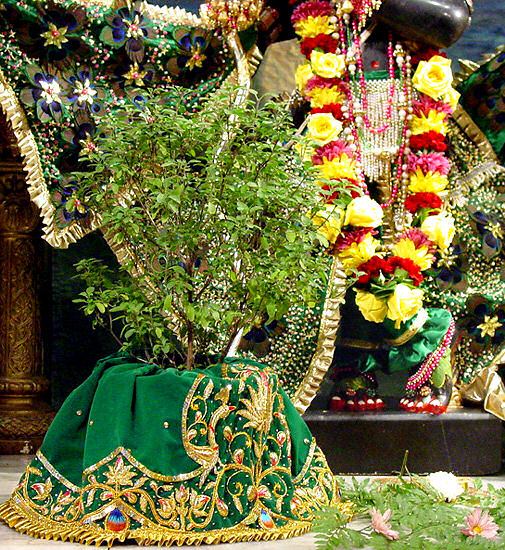
The worship of Śrīmatī Tulasī in the Temple
Immediately following Maṅgala-āratī, Tulasi-puja is offered. The devotees sing prayers to Tulasī-devī while one devotee offers Her ārati, then all circumambulate Tulasī-devī, offering her water. Preferably, ārati should also be offered to Tulsi in the evening, just before Sandhyā-āratī.
Begin Tulasi-arati by offering obeisances to Tulasīi-devī, chanting the Tulasī-Praṇāma mantra three times.
Śrī Tulasī Praṇāma
vṛndāyai tulasī-devyai / priyāyai keśavasya ca
viṣṇu-bhakti-prade devī / satya vatyai namo namaḥ
vṛndāyai—unto Vṛndā; tulasī-devyai—unto Tulasī Devī priyāyai- who is dear; keśavasya—to Lord Keśava; ca—and; viṣṇu-bhakti- devotional service to Lord Viṣṇu/ Kṛṣṇa; prade—who bestows; devi-O goddess; satyavatyai—unto Satyavatī; namo namaḥ—repeated obeisances.
I offer my repeated obeisances unto Vṛndā, Śrīmatī Tulasī-devī, who is very dear to Lord Keśava. O goddess, you bestow devotional service to Lord Kṛṣṇa and you possess the highest truth.
Next, the devotees sing Śrī Tulasī Kīrtana while one devotee offers ārati to Tulasī-devī with incense, a ghee lamp and flowers. While offering the articles, the devotee offering Tulasi-arati should stand on a mat (āsana) and ring a bell with the left hand. Just as when offering other āratis, the hands and paraphernalia should be purified (ācamana) with water from pancha-patra. After offering each item, they may be distributed to the devotees.
Śrī Tulasī-Kīrtana
namo namaḥ tulasī kṛṣṇa-preyasi namo namaḥ
rādhā-kṛṣṇa-sevā pābo ei abilāṣī
ye tomāra śaraṇa loy, tara vāñchā pūrṇa hoy
kṛpā kori’ koro tāre vṛndāvana-vāsi
mora ei abhilāṣa, vilāsa kuñje dio vāsa
nayana heribo sadā yugala-rūpa-rāśi
ei nivedana dhara, sakhīra anugata koro
sevā-adhikāra diye koro nīja dāsī
dīna kṛṣṇa-dāse koy, ei yena mora hoy
śrī-rādhā-govinda-preme sadā yena bhāsi
(1) O Tulasī, beloved of Kṛṣṇa, I bow before you again and again. My desire is to obtain the service of Śrī Śrī Rādhā and Kṛṣṇa.
(2) Whoever takes shelter of you has his wishes fulfilled. Bestowing your mercy on him, you make him a resident of Vṛndāvana.
(3) My desire is that you will also give me a residence in the pleasure groves of Śrī Vṛndāvana-dhāma. Thus within my vision I will always behold the beautiful pastimes of Rādhā and Kṛṣṇa.
(4) I beg you to make me a follower of the cowherd damsels of Vraja. Please give me the privilege of devotional service and make me your own maidservant.
(5) This very fallen and lowly servant of Kṛṣṇa prays, “May I always swim in the love of Śrī Śrī Rādhā and Govinda.
When Tulasī-pūjā Kīrtana song is finished, the devotees circumambulate Śrīmate Tulasī-devī at least four times, offering her water by pouring some at her root. (Water is only offered in the morning, not evening.) Use small spoons to help avoid over watering Her. While circumambulating, chant the Śrī Tulasī Pradakṣiṇa mantra.
Śrī Tulasī Pradakṣiṇa Mantra
(Sing while circumambulating Tulasī)
yāni kāni ca pāpāni / brahma-hatyādikāni ca
tāni tāni praṇaśyanti / pradakṣiṇaḥ pade pade
yāni kāni—whatever; ca—and; pāpāni—sins; brahma-hatya—killing of a brāhmaṇa; ādikāni—and so on; ca—also; tāni tāni—all of them; praṇaśyanti—are destroyed; pradakṣiṇaḥ—(by) the circumambulation (of Tulasī Devī); pade pade—at every step
Those who circumambulate Śrīmatī Tulasī-devī step by step destro whatever sins they have committed, even the killing of a brāhmaṇa.
Have the words to the Tulasī ārati prayers typed and posted so guests can see them. Encourage all guests to participate in Tulasi-arati. With a little encouragement, they will join in and enjoy themselves. The devotees should always bow down when they see Taulasi-devi, and others will follow in showing her respect.
Tulasī-devī should be kept in a special pot, and the pot should sit upon a stand, up off the floor. When carrying a potted Tulasī plant, it is traditional to honor Her by carrying the pot on one's head. If it's too heavy, carry the pot out in front. For worship, the stand Tulasī-devī sits on should be high enough so the base of the plant is above the waist of the devotee offering ārati. If it is not possible to keep a live Tulasī plant, one may offer worship to a picture of Tulasī-devī.
For one who is Tulasī's servant, that responsibility enters into all the different aspects of Her existence. You must see that She is being maintained properly, that Her leaves are always offered in a clean and fresh manner, and that all the devotees are given the opportunity to worship Her. Make Tulasī-devī some skirts to fit around Her pot, particularly when She is being offered ārati. If Tulasī is very close to, or on the altar, make sure that no candles or ghee lamps are placed close enough to burn her leaves. Use incense sparingly as it tends to make Her sick if burned continually. Garlands left for more than a day will mold and attract bugs, so if Tulasī is nearby, she will be affected.
While in Detroit, Śrīla Prabhupāda asked, "Where is Tulasī?". When She was brought in, Śrīla Prabhupāda put His garland around Her and had Her placed on the altar, saying "Mother Tulasī is so kind. Treat Her as you would any of Kṛṣṇa's pure devotees."
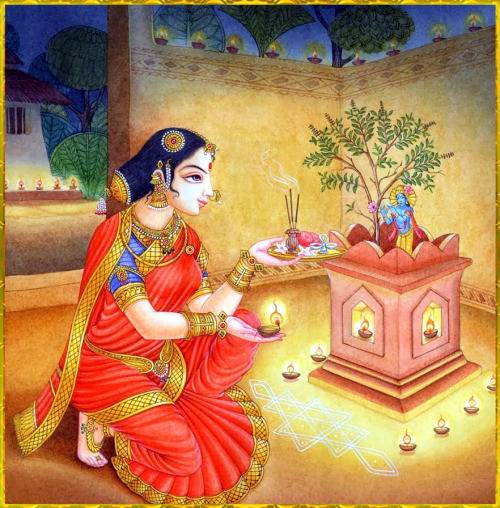
HOW TO PLUCK & USE TULSI LEAVES FOR OFFERINGS TO KRISHNA?
One should be clean before touching or plucking Tulasi. The Vayu Purana says that one who picks Tulasi without having bathed and then performs worship is an offender, and all his activities becomes useless.
With your right hand, carefully pick the tulasi leaves or soft tulasi-manjaris, along with their stems-one at a time-while repeatedly chanting the tulasi-cayana-mantra:
tulasy amṛta-janmāsi / sadā tvaṁ keśava-priyā
keśavārthaṁ cinomi tvāṁ varadā bhava śobhane
"O Tulasī of effulgent beauty, you were born from nectar, during the churning of the milk ocean. You are always very dear to Lord Keśava. Now, in order to worship Lord Keśava, I am collecting your leaves and mañjarīs. Please bestow your benediction on me that my worship will obtain success."
Take special care to avoid causing Śrīmatī Tulasī-devī any pain. If when picking Tulasi leaves one breaks the branches, Visnu feels pain in His heart. Pluck her leaves with your right hand while holding the branch in your left, taking care not to break it. Do not use scissors or a knife to cut the leaves from the plant. When finished, recite the ksama-prarthana-mantra, begging her pardon:
cayanodbhava-duḥkhaṁ ca / yad hṛdi tava vartate
tat kṣamasva jagan-mātaḥ / vṛndā-devī namo ’stu te
O Tulasī-devī, I offer my respectful obeisances unto you. Kindly forgive me if I have caused you pain by picking your leaves and manjaris, O mother of the universe.
Do not pluck Tulasī leaves in the morning before daylight or in the evening after dark, nor at any time on Dvadasi-tithi, the day following Ekadasi. Even if the tulasi leaves have become dry because they were cut on the previous day or in the morning, they may still be used in Deity worship.
AVOID PLUCKING TULSI LEAVES ON DWADASI
Tulasi should not be plucked on dvadasi. The Visnu Dharmottara says, Vaisnavas should never pick Tulasi on dvadasi tithi.
samkranty Adau ni Siddho'pi tulasyavacayah smrtau
param zrI viznu bhaktastu dvadazyam eva nesyate
"It is generally forbidden to pluck Tulasi on Sankranti, (Purnima, Amavasya, Dvadashi, Sunday) etc., according to the strict rules of the Smritis, but the most important rule (according to Shrila Sanatana Goswami) which the Vaishnava devotees should certainly follow is to not pluck Tulasi leaves on Dvadashi." (From Hari Bhakthi Vilasa 7.353)
nac chindat tulasim vipra
dvādaśyaṁ vaiṣṇavaḥ kvacit
"Oh brahmanas, a Vaisnava never picks Tulasi leaves on Dvadashi, (the day after Ekadashi)."
Why should we avoid plucking Tulasi leaves on Dvadasi?
Srimati Tulsi Maharani, the pure devotee of the Lord, keeps fasting on the whole Ekadashi and takes rest on Dwadashi. So the devotee in order to not to disturb or hurt her, don't pluck leaves on that day.
Then what to do to get the Tulsi leaves for offering on Dwadashi and other purposes?
Follow advance savings. Keep some advance Tulsi leaves for Dwadashi for offering purposes. Or , one may pick the leaves fallen on the ground around the pot and then after thoroughly washing it, can use it for offering.
Mantra when offering Tulasī leaves to Lord Kṛṣṇa
etat tulasī patram klīṁ kṛṣṇāya namaḥ
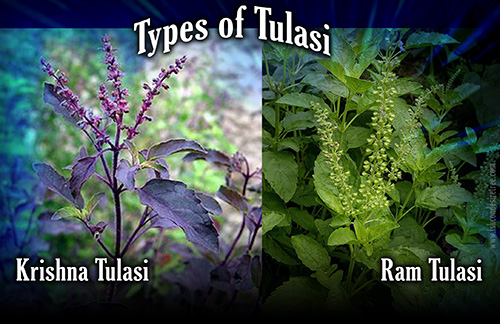
There are two types of Tulasī:
1. Kṛṣṇa Tulasī: This has purple colouring in the leaves and stems
2. Rāma Tulasī: This has green leaves and stems.
Both of these Tulasī are used in the worship of Lord Kṛṣṇa.
How-to-perform-Tulasī-Pūja
While this song is being sung by all the devotees gathered the offering of the ceremony simultaneously goes on. The paraphernalia [as shown in “Paraphernalia for performing Arati”] should be offered as follows
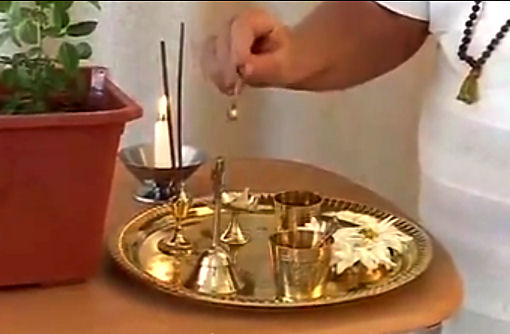
https://www.youtube.com/watch?v=PZtXQY5mL6o&feature=related
1) Perform achamana to purify the hands, [that is holding spoon in left hand first, one flick of water into the left hand to purify. Then with left hand put 3 drops of water into the right hand and say “Om Keshavaya Namah” sipping half of the water and the other half thrown on the ground. Repeat this step 2 more times saying “Om Narayanaya Namah” and “Om Madhavaya Namah” respectively.
2) Purify the Blowing Conchshell by pouring water from the Lota on it [there should be a bowl underneath to catch the water or if not that at least a cloth near by for wipe the floor at the end.]. The holding the Conch in either one’s right hand or both hands blow into to it 3 long blows and then rinse the conch again with water from the Lota. Once the conch has been blown the singing begins.
3) There should already be a candle lit separately for lighting the incense and ghee lamp.
Holding the spoon from the Achaman cup in the right hand do one right flick of water [to purify the right hand] then place three drops of water on the bell [bell should be held in one’s left hand and be rung continuously through the offering of paraphernalia] then hold in left hand then with right hand light the incense sticks [either the number 1, 3 or 5] and then place 3 drops of water on the incense sticks. Then in a circular motion moving the hand clockwise one should wave the incense aroundthe picture ofSrila Prabhupada on the Vyasasanaand then the Tulasi plant, after that offer 3 big circles around the audience.
4) Once this is done one should again blow the blowing Conch according to step 2. After this is done one should water the floor near the altar to clean any spilt water in the offering process and then offer full flat prostrated obeisances in front of the altar from left to right while reciting Srila Prabhupada’s pranama mantra
5) The arati paraphernalia should be taken to the kitchen for washing and cleaning.
6) Step 3 should be repeated for the remaining 2 items namely the ghee lamp and fragrant flowers [either1, 3 or 5] respectively.
7) There are a few things to be noted: a) Before Tulasi is brought in the temple room for worship the curtain on the Pancha Tattva altar is closed. A table should be place in the middle of the temple room b) As the Tulasi plant is brought into the room and place of the table the audience says “Srimati Tulasi maharani ki jaya” [All Glories to the topmost queen Srimati Tulasi] the devotees all bown down by offering half obeisances with head touching the floor. The devotee who will be leading the Kirtana loudly recites the “Tulasi Pranama Mantra” [as mentioned above] 3 times with the audience responding loudly each time c) After the conch is blown signaling the beginning of the arati the“Tulasi Kirtana” begins, when the pujari[ devotee who offers the ceremony] completes it the lead singer begins to recite the “Tulasi prayer” [as mentioned above] 3 times. While this is going on the devotees in the audience come up to the Tulasi plant and purifying the right hand with a right flick of water into the right proceed to offer 3 drops of water from the achamana cup at the root of the Tulasi plant d) after the “Tulasi Kirtana” has been chant thrice by the lead singer he then breaks into the Hare Krishna mantra at leats 3 time or until all the audience has offer Tulasi 3 drops of water. The lead chanter then finishes of by chanting Jaya Vrnda-devi! Jaya Tulasi Maharani and Jaya Prabhupada! with the audience.
namas te narasimhaya
prahladahlada-dayine
hiranyakasipor vakshahsila-
tanka-nakhalaye
I offer my obeisances to Lord Narasimha who gives joy to Prahlada Maharaja and whose nails are like chisels
on the stonelike chest of the demon Hiranyakasipu.
ito nrisimhah parato nrisimho
yato yato yami tato nrisimhah
bahir nrisimho hridaye nrisimho
nrisimham adim saranam prapadye
Lord Nrisimha is here and also there. Wherever I go Lord Nrisimha is there. He is in the heart and is outside
as well. I surrender to Lord Nrisimha, the origin of all things and the supreme refuge.
Prayer to Lord Nrisimha
by Jayadeva Gosvami
tava kara-kamala-vare nakham adbhuta-sringam
dalita-hiranyakasipu-tanu-bhringam
kesava dhrita-narahari-rupa jaya jagadisa hare
O Kesava! O Lord of the universe! O Lord Hari, who have assumed the form of half-man, half-lion! All glories
to You! Just as one can easily crush a wasp between one’s fingernails, so in the same way the body of the
wasplike demon Hiranyakasipu has been ripped apart by the wonderful pointed nails on Your beautiful
lotus hands.

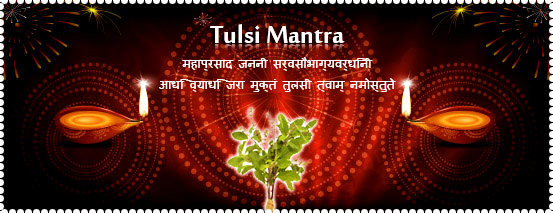
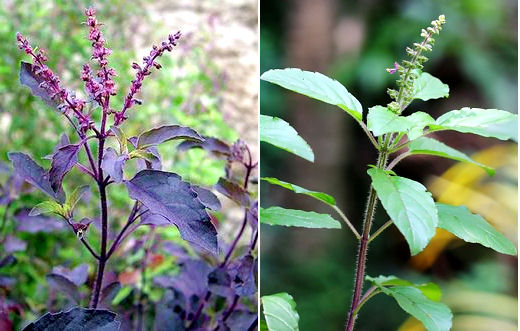
Replies
Yikes now I'm depressed. There is so much to memorize and I can't even pronounce the words let alone memorize them in a coherent fashion/ You may have bit off more than you can chew trying to bring me on board. I can make sounds but it's unintelligible.
Okie dokie. You might find the Morning Program group useful, as tunes etc are there. Surely you have heard all these many times at mangala artik, six years etc. All SP's disciples know these enough to sing along at least, and better is to know the meaning of each word so that it can be meditated upon during the sadhana programs at home or temple. The amt of program is up to you, but we are asked to chant 16 rounds daily and etc which you are doing. Here, we are leaving all this up to you, as we do not have a physical temple. The devotees here see each other and know roughly whats going on to a degree in each others's minds. Ideally our members would have their own local sankirtan etc and start to do ritvik diksha ceremonies locally.
The principle again is doing what one can to one's abilties. We have to set the ideal, and in some cases the standards, but what applies at 17 does not apply the same at 71.
You will still have to do a home fire sacrifice, so the materials in brahmana group here, such as fire sacrifices, would be necessary at a minimum re procedural complexity. But even that is actually simple. Even a Herculean task becomes small when one takes it little by little. Read the above material, read it again, read it every day once, you will become familiar quickly, so that when you are at a temple you will not simply be bewildered. go to local Vaisnava temples become familiar with daily interaction culture, how to be a devotee superficially and not freak out the regulars, lol
ps i am not a guru, just a brahman in the temple. I do not do guided training in intro to bhakti yoga, i have no such time, but we have been through the classes programs in past, that takes two three years, but i am not myself doing those anymore, too many problems here at home lately.
It is new to me someone who cannot memorize the required mantras. But, maha mantra is sufficient. Kindly once having read all these intro materials, as i see you fastidiously do, continue to the brahmana fire sacrifice thing, get to know the group and contents. We have assembled everything basic you will need to know, but have not been available to start a physical temple lately, nor would there be many of spiritnet willing to relocate to one city. So we hope it will grow locally and spread like apple trees.
Yes, i have myself memorized reams of sound strings that i do not know the meaning of those words except in English. Hence the importance of knowing the meaning of each word and line to enter into the moods better at kirtan. At a certain age, apparently this becomes harder, so become familiar with the material, listen to examples of kirtan at morning program group is nice also while chanting one's rounds. That group never got off the ground much, but i searched out pukka standard kirtan tunes only. I go there now in review myself and to listen.
https://puredevoteeseva.ning.com/group/spimorningprogram
Shikshashtaka: The Eight Prayers by Sri Chaitanya Mahaprabhu.
cheto-darpana-marjanam bhava-maha-davagni-nirvapanam
sreyah-kairava-chandrika-vitaranam vidya-vadhu-jivanam
anandambudhi-vardhanam prati-padam purnamritasvadanam
sarvatma-snapanam param vijayate sri-krishna-sankirtanam
(1) Glory to the sri-krishna-sankirtana, which cleanses the heart of all the dust accumulated for years and extinguishes the fire of conditional life, of repeated birth and death. This sankirtana movement is the prime benediction for humanity at large because it spreads the rays of the benediction moon. It is the life of all transcendental knowledge. It increases the ocean of transcendental bliss, and it enables us to fully taste the nectar for which we are always anxious.
namnam akari bahudha nija-sarva-shaktis
tatrarpita niyamitah smarane na kalah
etadrisi tava kripa bhagavan mamapi
durdaivam idrisam ihajani nanuragah
(2) O my Lord, Your holy name alone can render all benediction to living beings, and thus You have hundreds and millions of names, like Krishna and Govinda. In these transcendental names You have invested all Your transcendental energies. There are not even hard and fast rules for chanting these names. O my Lord, out of kindness You enable us to easily approach You by Your holy names, but I am so unfortunate that I have no attraction for them.
trinad api sunichena
taror api sahishnuna
amanina manadena
kirtaniyah sada harih
(3) One should chant the holy name of the Lord in a humble state of mind, thinking oneself lower than the straw in the street; one should be more tolerant than a tree, devoid of all sense of false prestige, and should be ready to offer all respect to others. In such a state of mind one can chant the holy name of the Lord constantly.
na dhanam na janam na sundarim
kavitam va jagad-isha kamaye
mama janmani janmanisvare
bhavatad bhaktir ahaituki tvayi
(4) O almighty Lord, I have no desire to accumulate wealth, nor do I desire beautiful women, nor do I want any number of followers. I only want Your causeless devotional service, birth after birth.
ayi nanda-tanuja kinkaram
patitam mam vishame bhavambudhau
kripaya tava pada-pankaja-
sthita-dhuli-sadrisham vicintaya
(5)O son of Maharaja Nanda [Krishna], I am Your eternal servitor, yet somehow or other I have fallen into the ocean of birth and death. Please pick me up from this ocean of death and place me as one of the atoms at Your lotus feet.
nayanam galad-ashru-dharaya
vadanam gadgada-ruddhaya gira
pulakair nicitam vapuh kada
tava-nama-grahane bhavishyati
(6) O my Lord, when will my eyes be decorated with tears of love flowing constantly when I chant Your holy name? When will my voice choke up, and when will the hairs of my body stand on end at the recitation of Your name?
yugayitam nimeshena
chakshusha pravrishayitam
sunyayitam jagat sarvam
govinda-virahena me
(7) O Govinda! Feeling Your separation, I am considering a moment to be like twelve years or more. Tears are flowing from my eyes like torrents of rain, and I am feeling all vacant in the world in Your absence.
aslishya va pada-ratam pinashtu mam
adarshanan marma-hatam karotu va
yatha tatha va vidadhatu lampato
mat-prana-nathas tu sa eva napara
(8) I know no one but Krishna as my Lord, and He shall remain so even if He handles me roughly by His embrace or makes me brokenhearted by not being present before me. He is completely free to do anything and everything, for He is always my worshipful Lord, unconditionally.